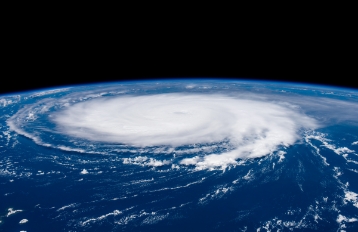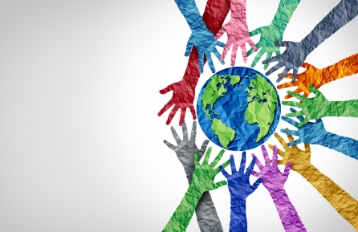Operationalizing Climate Resilience
for the Whole Community

Equipping Leaders
with Methods, Tools, and Training
for a Sustainable Future
Courses for Operationalizing Climate Resilience

Conducting Whole Community Climate Risk & Vulnerability Assessments
Extreme weather events are on the rise, becoming more frequent, severe, and long-lasting. This makes it challenging for communities to assess and manage risks that are typically based on historical data. To prepare for risks associated with climate change, we must incorporate methods that leverage future projections and their impacts throughout the community.
Is your community ready to address the impacts of climate change?

Ensuring Access to Public Information and Warning for the Whole Community
Diverse populations receive, process, and interpret risk differently. When communication breakdowns occur, the result is catastrophic. Building trust and effective communication methods across the whole community is essential to improving survivability and more equitable outcomes.
Are you equipped to effectively communicate climate risks across the whole community?

Crisis Leadership: Resolving Climate Impacts Through Community Lifelines
As climate-induced disasters become more frequent, intense, and longer in duration, communities need to establish more robust systems for mitigating these impacts and addressing disproportionate effects on vulnerable populations.
Are you ready to implement climate resilience strategies?
The escalating frequency, consequences, and duration of extreme weather events coupled with a changing climate will reshape communities and ecosystems. Understanding and adapting to these challenges is crucial to ensuring a sustainable and secure future.
According to the Fourth National Climate Assessment, by the end of the century, financial losses due to climate change could reach hundreds of billions of dollars annually across multiple sectors, including health, agriculture, and infrastructure, putting the well-being of millions at risk.

How can communities operationalize climate resilience and improve outcomes for the whole community?
Developing strategies to prepare underserved populations and disadvantaged communities will enhance resilience for the whole community across all hazards.
According to the NCA, extreme heat and heavy precipitation events are intensifying due to climate change. These climate changes can deepen existing social and economic inequalities, as vulnerable communities often lack the resources for effective response and adaptation
Our Training Will Provide Community Leaders:
Effective CommunicationTools
Empowering disadvantaged communities with real-time, risk- based information to enhance their climate resilience.
Risk-based Planning Strategies
Essential resources to support whole community climate resilience and disaster preparedness efforts.
Expanded Collaborative Networks
Strengthen regional relationships among government, community- based organizations, private sector, and citizens.
Enhanced Decision-Making Skills
Promote effective crisis leadership through deliberate planning, training, and collaboration among community leaders.
More about ASG’s and GTRI’s Partnership

Georgia Tech and ASG have a long history of providing quality courses to communities across the United States.
In 2016, FEMA awarded Georgia Tech, in partnership with ASG, a 3-year grant to develop and deliver five new hazardous materials training courses aimed at strengthening community response and management of hazardous materials disasters. It was a successful partnership, and the delivery of the objectives outlined in the grant was completed in 2019.
In 2020, FEMA awarded a 3-year grant to develop and deliver training, tools and resources aimed at building economic recovery capabilities among American businesses through enhancing whole community and regional resilience. The training also provided Economic Develop Organizations (EDO) with the tools and resources required to support businesses during the recovery process of major disasters.
In 2022, FEMA awarded a 3-year grant to develop and deliver training, tools and resources for operationalizing climate resilience with a focus on extreme weather events which are becoming more frequent, severe, and prolonged. Communities and ecosystems are being reshaped, challenging local leaders to take proactive measures. Adapting to this evolving reality is essential for a sustainable and secure future.
In 2023, Georgia Tech and ASG teamed with NABEDC and Southwestern Indian Polytechnique Institute under another FEMA grant to develop and deliver training, tools and resources that focused on Enhancing Tribal Nation Readiness and Resilience to strengthen Tribal Nation capabilities and capacities.
Georgia Tech’s Enterprise Innovation Institute (EI²) Global is the business outreach arm of Georgia Tech, serving as the primary vehicle to achieve the goal of expanded local, regional, and global outreach in support of businesses. EI² has a rich history of supporting EDOs which has led to hundreds of community projects in economic development training, strategic planning, workforce development, manufacturing community development, infrastructure programs, innovation and entrepreneurship ecosystem building, and fiscal and economic impact analyses. EI² brings a wealth of knowledge, expertise and research to this project ensuring a thorough and effective training program.
ASG has over 20 years of corporate experience developing innovative training, exercises and management programs that build sustainable disaster preparedness and environmental, health and safety capabilities among both the private and public sectors. ASG’s subject matter experts have served over 3,000 communities worldwide (pop. 75 Mil), reaching 17 countries and 49 states. ASG’s comprehensive approach to building resilience and response capabilities contributes greatly to the successful development and rapid delivery of new courses to meet emerging, national needs.
